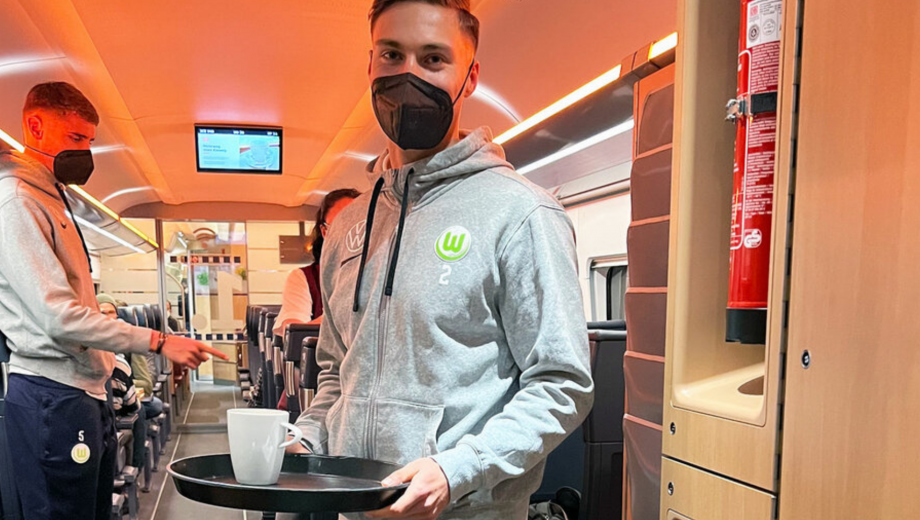“Race To Zero” – VfL Wolfsburg unveils their ambition track to net zero by 2025
“Green. More than a color.” This is the Wolves’ rallying cry against global warming and a clear statement with which VfL are setting new standards in sustainability and climate protection. VfL Wolfsburg, signatory of the UN Sports for Climate Action, are the first professional football club in the world to support the “Race To Zero” movement by setting clear ambitious and measurable climate targets “. Where is the journey heading? Towards climate neutrality and net zero emissions by 2025. These are ambitious goals with a clear course of action, because the challenge at hand is no less than one of the greatest humanity has ever faced: the effects of climate change. VfL Wolfsburg’s contribution is not limited to the club’s own CO2 emissions, but also to those that can be influenced indirectly, such as fan mobility. With clearly defined measures on topics such as e-mobility and renewable energy, and a mixture of reduction and compensation, the Wolves want to lead by example, demonstrate concrete actions as part of their commitment to UN Sports for Climate Action and support the global “Race To Zero” campaign. “Our plan is to live out climate protection authentically at the club and to set league-wide standards,” said VfL Managing Director Michael Meeske. “Only by working together can we achieve the transition to a CO2-neutral football business.”
Living out climate protection authentically in the club
International climate protection is one of the greatest global challenges facing humanity. In order to limit the impact of climate change, greenhouse gas emissions need to be reduced worldwide. This is why VfL Wolfsburg has joined UN Sports for Climate Action and is supporting the “Race To Zero” campaign. As the first European football club from one of the top leagues, the Green-and-Whites officially commit themselves to undertaking ambitious climate protection measures, and do their part in limiting global warming to below 1.5 degrees temperature goal . Meeske: “Rapid and decisive action is needed to significantly limit the rise in the average global temperature. At VfL Wolfsburg, we want to reduce greenhouse gas emissions to net zero by 2025 and thus be CO2-neutral in five years. To do this, we need a clear and fair target against which our contribution as a club and as an industry can be measured.”
Ambitious reduction targets
Net zero is the overriding aim of the VfL climate strategy. It means that all greenhouse gas emissions caused by VfL are removed from the atmosphere or avoided elsewhere. The Wolves will pursue a two-pronged strategy to this effect: pursuing ambitious reduction plans and compensation for the remaining footprint. Together with external experts, the Bundesliga club have developed a binding pathway towards reduction based on scientifically sound targets: using the 2017/2018 season as a starting point, total greenhouse gas emissions are set to reduce by 6.45 per cent annually. By 2030, this will result in a reduction of 55 per cent compared to the reference year 2017/2018. The reduction path follows the methodology of the Science Based Targets Initiative and covers all three Greenhouse Gas protocol (GHG) scopes and does not include offsets. The UN Climate Change, through its Sports for Climate Action initiative, is an important partner of the Wolves in the fight against CO2 emissions. “We are delighted to see VfL Wolfsburg as demonstrating climate leadership by setting ambitious climate targets and hope that it will help inspire many other football clubs to also join the ambition track to net-zero, said Niclas Svenningsen, Global Climate Action Manager at UN Climate Change”
Responsibility for the environment and ecosystem since 2010
As forerunners and pioneers, VfL Wolfsburg have already consistently reduced their own CO2 footprint over the past ten years and will continue their efforts in this direction. In doing so, the Green-and-Whites are taking responsibility for the environment, the ecosystem and mankind. “Support for the UN campaign is based on a package of measures to combat CO2 emissions and find sustainable and innovative solutions,” said Nico Briskorn, Head of Corporate Social Responsibility (CSR) at VfL Wolfsburg. “The consequent conversion to 100 per cent green electricity (2011), new buildings in line with the latest energy efficiency standards and the conservation of natural resources through the consistent use of LEDs, reusable systems and recycled paper are just a few examples from recent years. Now we are taking the next big step with the United Nations.” Volkswagen, the parent company of VfL Wolfsburg, is also committed to the Paris Agreement. By 2050 the car manufacturer wants to make the entire group CO2-neutral in its balance sheet. As with VfL, achieving the ‘green zero’ is also the target here.
Green. More than a color
The club’s greenhouse gas emissions will be significantly reduced in the coming years as a result of a series of concrete steps. For example, at VfL Wolfsburg the e-charging infrastructure will be expanded and both professional players and employees will increasingly use company cars from Volkswagen’s fully electric ID. family in the future. In this way, VfL will contribute to climate-friendly forms of transport. Another driving force behind the energy transition is self-produced solar power. In the coming year, the Wolves will expand their photovoltaic system in order to generate even more green and affordable electricity from sunlight. Another measure to reduce CO2 emissions will be the conversion to more climate-friendly natural gas.
Working together to keep emissions as low as possible
An analysis of the club’s emissions footprint shows that the area of transportation remains the largest variable overall. Sporting success increases travel activity. For VfL, this not only means transport for teams and club employees, but also for fans and media representatives. However, the club cannot directly influence their CO2 emissions. Instead, it can provide incentives for climate-conscious (travel) practices. In future, and by implementing a holistic approach, VfL and the club’s partners want to inspire their communities even more keenly with a view to the transportation of tomorrow, because the stated objectives can only be achieved together. For example, fans will be able to purchase a climate-neutral ticket in the future, while the men’s and women’s teams have decided to compensate for their travel to away games from their respective team coffers. In this way, climate protection becomes real teamwork. VfL will compensate all other non-reducible CO2 emissions from business and team travel (from the Scope 3 area), as well as the non-reducible CO2 emissions from Scopes 1 and 2. The UN backed credits acquired for this purpose also meet the highest standards. “Even if a football club cannot always operate fully sustainably in all areas due to its operations today, we want to show that successful climate protection and a successful VfL Wolfsburg are not mutually exclusive,” concluded Meeske.
The principle of Scopes is based on the distinction between direct and indirect emission sources:
- Direct emissions (Scopes 1 and 2): Emissions from sources that the company either owns or directly controls. These include company vehicles or electricity and district heating.
- Indirect emissions (Scope 3): Emissions that arise as a result of company activities but that are owned or controlled by a third party, such as fan mobility.
You can find the Sustainability Report of VfL Wolfsburg in the resources section of this website.
Greenfoot




